Mehul Reuben Das Feb 21, 2023 10:54:17 IST
Pros
— Sheer Efficiency
— Rates compared to rivals
— Larger Cache and Core Count
— Strong multicore and single-core efficiency
— Hybrid Architecture
— Suitable with previous Chipsets
— Efficiency practically at par with the i9 at simply a portion of the expense
Cons
— Power usage
— Requirements a correct cooling option to draw out all the efficiency.
— Perhaps the last generation of CPUs utilizing the LGA 1700 Socket
Cost: Rs 44,500
Ranking: 4.5/ 5
Intel 13th Gen i7 13700K Evaluation: Summary
Intel’s i7 lineup of CPUs has actually been the very best for high-end desktops, committed to video gaming, for several years now. Yes, there’s the i9 lineup of Intel CPUs, however unless you’re a severe material developer who’ll really utilize all the cores at their greatest speeds, the i9 would resemble taking a fighter jet to a gunfight. Yes, you can do that, however that’s one overachieving reaction if there ever was one.
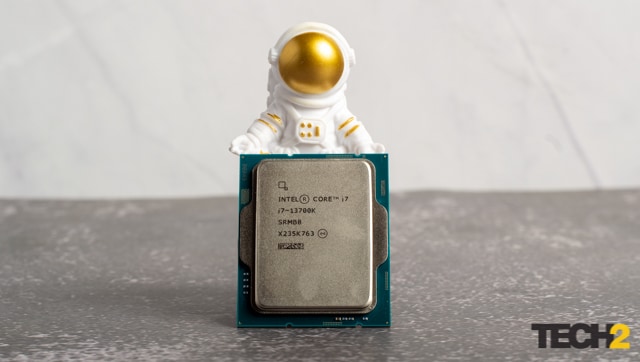
The lower-tiered i5 13600K is a strong mid-tier entertainer and has actually been vital in developing Intel’s position as the go-to CPU for mid-tier video gaming. The i7-13700K takes all that efficiency, turns the dial approximately 11 and simply goes all out.
For a couple of years now, Intel has actually had to play capture up with AMD’s Ryzen series and the efficiency they used throughout various rate points. With the 13th Gen Intel processors, particularly the i5 13600K and the i7 13700K, lastly, group red has a rival that offers a correct and tough battle.
What sets the current generation of Intel’s CPUs is their hybrid architecture. Intel began their present hybrid architecture with the Alder lake lineup. With Raptor lake, Intel has fine-tuned and turned the dial all the method to 11.
Although the 13th Gen CPUs are still based upon the exact same Intel 7 procedure as the 12th Gen, and it has the exact same hybrid style of efficiency cores (P-cores) and performance cores (E-cores), the Core i7 13700K has the exact same variety of cores as the Intel Core i9 12900K from the previous generation. All in all the i7 13700K CPUs have two times as numerous E-cores as the previous generation. Generally, you get 8 Efficiency cores and 8 Performance and 24 threads.
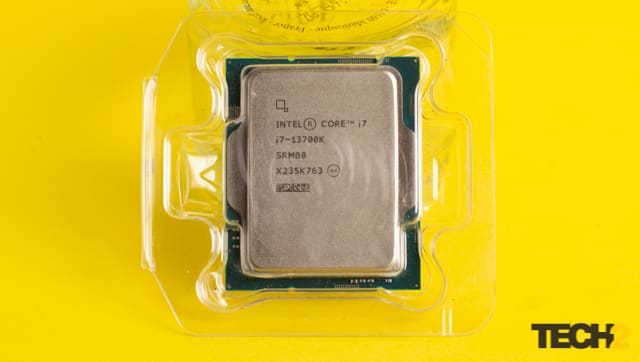
It truly is a much better variation of the i9 12900K however for a lot less cash. Since hyper-threading is made it possible for on the core i7 13700k, the P-Cores have a thread count of 16. The E-Cores do not support multithreading. This essentially increases the thread rely on this SKU to 24 compared to the core i7 12700k’s thread count of 20.
Completion outcome is that you get a great CPU that punches above its weight class, and carries out like a monster.
Intel 13th Gen i7 13700K Evaluation: Specs
Intel’s 13the Gen CPUs, consisting of the Intel i5 13600K Intel and the i7 13700K is based upon the Raptor lake architecture, which is a generational enhancement over the Alder lake architecture. Like the previous generation of Intel CPUs, the i7 13700K utilizes the Intel 1700 socket and is used the Intel 7 production procedure. The 13th Gen CPUs are anticipated to be the last CPUs constructed on Intel 7 prior to the relocate to Intel 4, and the last to support the Intel 1700 socket.
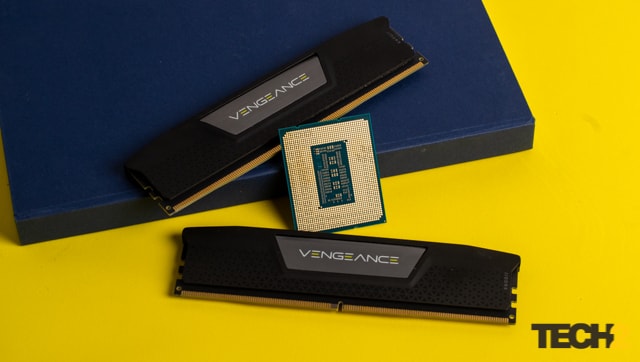
The i7 13700K includes an overall of 16 cores, which includes 8 P-cores and 8 E-cores, and has an overall of 24 threads. The P-Cores have a base clock of 3.40 GHz, whereas E-Cores have a base clock of 2.50 GHz. In general, the optimum turbo frequency is 5.4 GHz. This is a single thread frequency from the Turbo Increase Max Innovation 3, and it depends on the temperature level and power conditions, in addition to the load type.
The P-Cores’ optimum turbo frequency is 5.3 GHz. The E-Cores’ optimum turbo frequency is 4.2 GHz. When it comes to power usage, the CPU’s power draw is 125W at base frequencies and 253W at optimum turbo frequency.
Multi-threaded efficiency gets another increase thanks to Intel’s hyperthreading innovation on the higher-boosting P-cores.
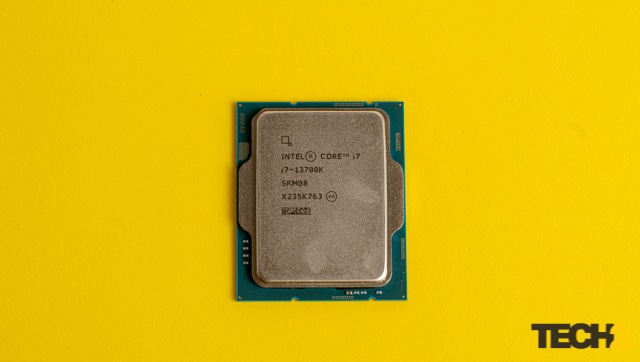
All of this makes the whole 13th Gen lineup of CPUs the very first consumer-grade desktop CPUs to breach the 5GHz barrier. This likewise makes the 13th Generation of CPUs the fastest on the planet, out of package.
The whole L2 cache size is 24MB, while the L3 cache size is 30MB. In contrast, the Intel i7 12700K had an L2 Cachce of 14MB and and L3 cache of 25MB, whereas the Intel i9 12900K had an L2 Cache of 12MB and an L3 cache of 30MB. The boost in Caches throughout the board is considerable.
Intel has actually likewise raised the L2 cache for each p-core from 1.25 MB to 2MB and doubled the quantity of L2 cache for each cluster of e-cores to 4MB in the 13700K. Intel likewise increased the L3 cache by 5MB.
When it comes to the onboard graphics, the Core i7 13700K includes UDH 770 GPU and has a base clock of 300MHz with an increase clock of 1.6 GHz. It consists of 32 processing systems. The optimum resolution supported by HDMI is 4096X2160 at 60Hz. On Show Port, the output resolution is 7680 Ã 4320 at 60Hz. The CPU likewise supports Intel Quick Sync Video and Clear Video HD innovation, with an optimum display screen assistance of 4.
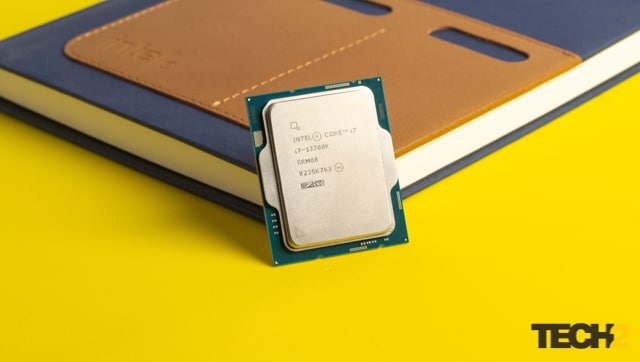
The Core i7 13700K supports both DDR4 and DDR5 RAM, similar to the Core i5 13600K, and the previous-gen Alder lake CPUs. Nevertheless, with the Raptor lake CPU, users get a much faster DDR5 memory controller that supports DDR5 approximately 5600MHz. You likewise get assistance for approximately 128GB RAM in embeded in dual-channel setup, in addition to ECC memory assistance.
The CPU has 8 DMI lanes based upon DMI 4.0. When it comes to PCIe lanes, they work with both, PCIe Gen 4.0 and 5.0 and are an overall of 20, with 16 for the GPU and 4 for any suitable NVMe SSD. The SKU works with PCIe Gen 4.0 and 5.0.
Intel 13th Gen i7 13700K Evaluation: Compatibility
Although Intel’s 13th Gen CPUs include the brand-new Z790 chipset, they are likewise in reverse suitable with the Z690 in addition to the H670 and B660 chipsets, all of which have the LGA 1700 socket. Simply guarantee that your motherboards have actually had their BIOS and firmware upgraded for the 13th Gen CPUs, and you’ll be excellent to go.
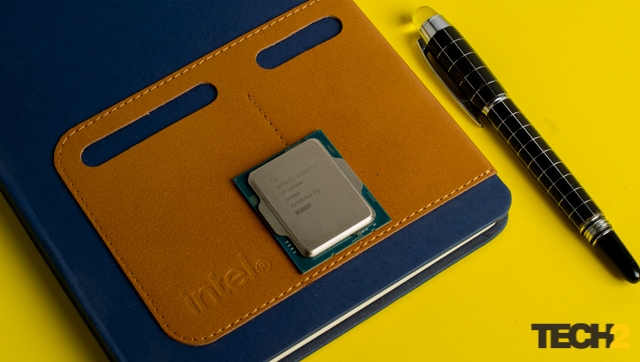
The Z690 and H670 motherboards do let you utilize DDR5 memory, however with differing constraints on XMP profiles, so you may wish to check out that. The Z790 motherboards, though a little pricey, are well worth the cash invested for they have some brand-new functions that the Z690 and comparable boards do not. For instance, a Z790 board from a trusted partner maker will have PCIe 5.0 assistance, in addition to a lot of other animal conveniences, which, in the long run, will show useful.
And because this is an i7 that we are discussing, combining it with the very best offered RAM would offer you simply that little additional increase, so once again, we suggest purchasing a Z790 board.
Intel 13th Gen i7 13700K Evaluation: Our test bench
For our tests, we ran the Core i7 13700K with the Z790 motherboard. Offered the power usage of the chip, we did not wish to run the risk of leaving any efficiency on the table, so we chose our own MSI MAG CoreLiquid 360R V2. For RAM, we chose a set of Revenge 32GB package (2x16GB) DDR5 performing at 5200MHz that Corsair provided us.
For the GPU, we were utilizing our own MSI GeForce RTX 3070 Ti Ventus 3X 8G OC, and the Corsair CX750 Watt modular PSU for power.
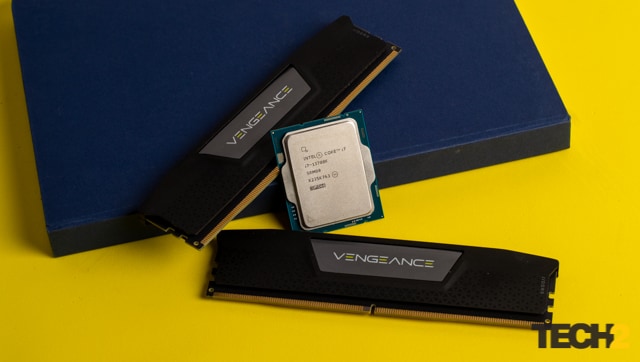
Intel 13th Gen i7 13700K Evaluation: Efficiency
It need to not come as a surprise that the Core i7 13700K entirely obliterates the annihilates the last generation Core i7 12700K throughout criteria. What is unexpected though is that it carries out simply as well as the last generation Core i9 12900K, in a variety of situations, with really couple of sacrifices in regards to power usage and temperature levels. This remains in extension of our findings when we examined the Core i5 13600K
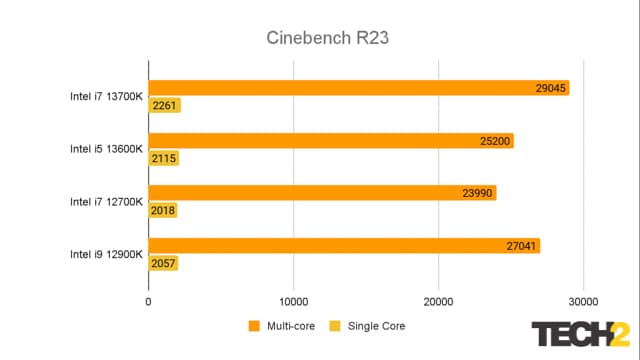
There are a variety of reasons the 13th Gen CPUs are carrying out so much better than the 12th Gen CPUs. Initially, is the boost in the variety of E-Cores throughout the lineup, however more notably, in the Core i7 13700K. Second, Intel has actually increased the size of the L2 caches on its Raptor Lake processors, in addition to a minor enhancement in the read and compose speeds.
Intel’s 13th-generation CPUs likewise consist of some appealing abilities that make life much easier for customers, especially when it concerns background operations. Thread Director, for instance, works together with the Windows Scheduler. Basically, the CPU will categorise the threads and help the system in identifying which ones to use for jobs. This enables considerably more effective management of background operations.
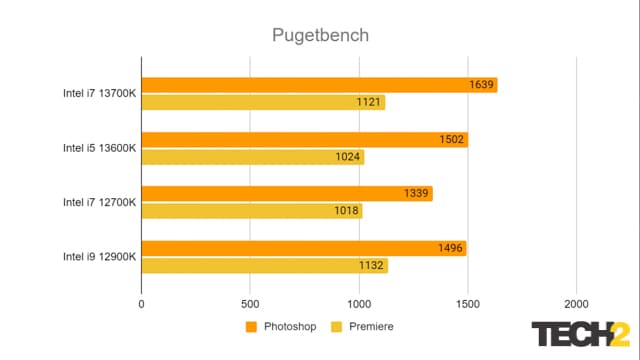
If we take a closer take a look at how the cores act throughout the Cinebench, we see that the i7 13700K kept an all-core frequency of 5.2 GHz for the P-cores and 4.1 GHz for the E-cores after an hour of load screening. The 13700K afterwards appeared to sustain a clock frequency of 5.4 GHz under tension for single-core operations.
Please remember that depending upon the load type, this turbo frequency is simply for a single core, and there are a huge selection of variables that may effect it. Thermal headroom, power limitation, cooling option, thermal paste application, how outstanding a motherboard is, and so on, in addition to the load type.
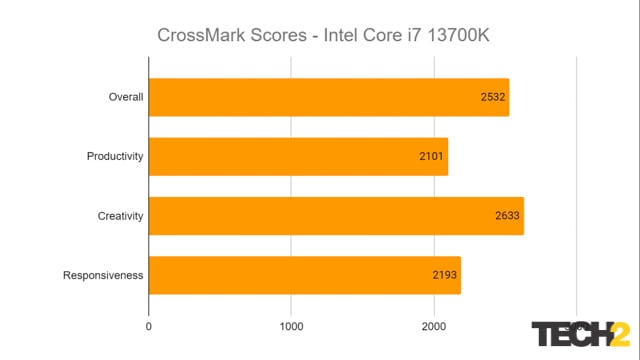
In video games too, the CPU carried out incredibly well, which, provided its benchmark ratings, should not come as a surprise. In Battleground 5, we were regularly getting 175+ fps at 1440p, whereas in titles like Far Cyr 6, Forza Horizon 5, and Borderlands 3, we were regularly overcoming 100fps at 1440p.
Intel 13th Gen i7 13700K Evaluation: Power usage & & thermals
When it concerns core power use the i7 13700K is close to the i9 12900K however still a little lower thanks to Raptor Lake architectural upgrades. Having stated that, it is more power-hungry than the i7 12700K.
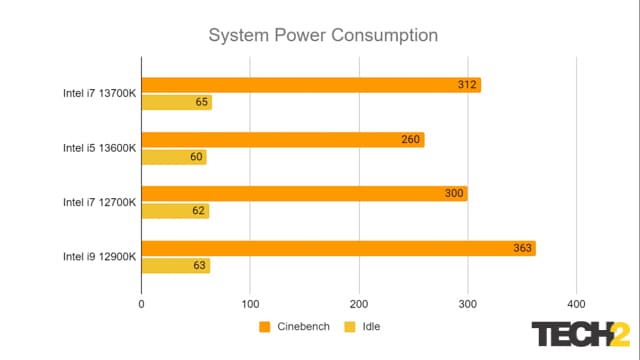
The i7 13700K’s thermal efficiency is once again at par considering its total speed. Though the i7 13700K performs at 98-99, changing in between the 2, without hindering the efficiency.
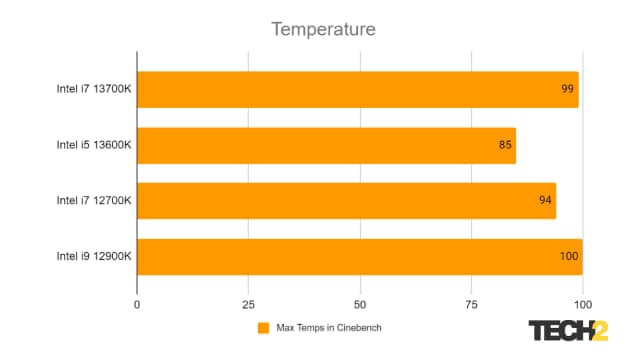
Even under the heaviest of loads, our CPU did not strike the feared 100 degrees in a closed case.
Intel 13th Gen i7 13700K Evaluation: Decision
General, the Core i7-13700K has a healthy efficiency profile, without any apparent drawbacks in specific kinds of efficiency apps. As an outcome, the 13700K is a nimble player in addition to an excellent all-rounder processor for efficient jobs.
The Core i7 13700K has a strong price-to-performance benefit, which is even higher when we think about motherboard and memory expenses. Intel has actually kept compatibility for DDR4 memory, making it possible for a path to considerably lower memory and motherboard expenses than AMD’s AM5 environment, which requires DDR5 memory. Intel declares that if a previous-generation 600-series motherboard has proper power shipment, you will not lose any efficiency, providing another opportunity for worth hunters.
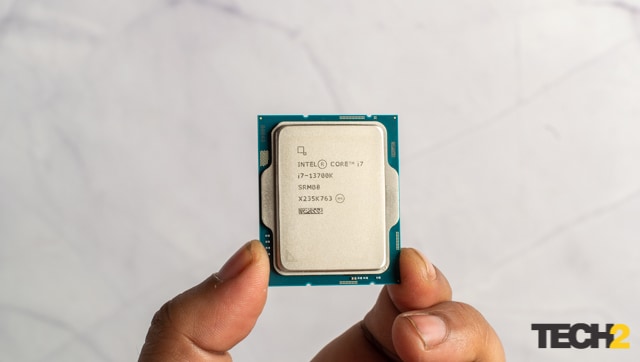
If you’re looking just to video game on your system and are trying to find an affordable, mid-tier video gaming tower, then the Intel Core i5 13600K is still the much better option, as you can quickly start lower and after that develop your system slowly, particularly if spending plan is a restriction for you and you make certain you will not enter major material production anytime quickly.
Nevertheless, if you intend on streaming or any major material production, you will be much better off with the Core i7 13700K. Think about it in this manner– it is significantly friendlier on the pocket if you attempt and spec out a comparable device from group red, and even then, you will be leaving some single-threaded in addition to multithreaded efficiency on the table. You will successfully need to invest significantly more if you intend on getting an AMD device, that carries out like the i7 13700K. And due to the fact that the efficiency is practically at par with in 2015’s i9 12900K, if not much better in a lot of situations, you get to delight in the fruits of state-of-the-art CPU, however at a substantially lower expense.